Wrote Ancestor Trouble, a best of the year per New Yorker, NPR, Washington Post, Esquire. Advocate for acknowledging tough family histories. Most recently in Narrative, Baffler, Guardian, NYT. Opinions mine. NYC. She/her.
Don't wanna be here? Send us removal request.
Text
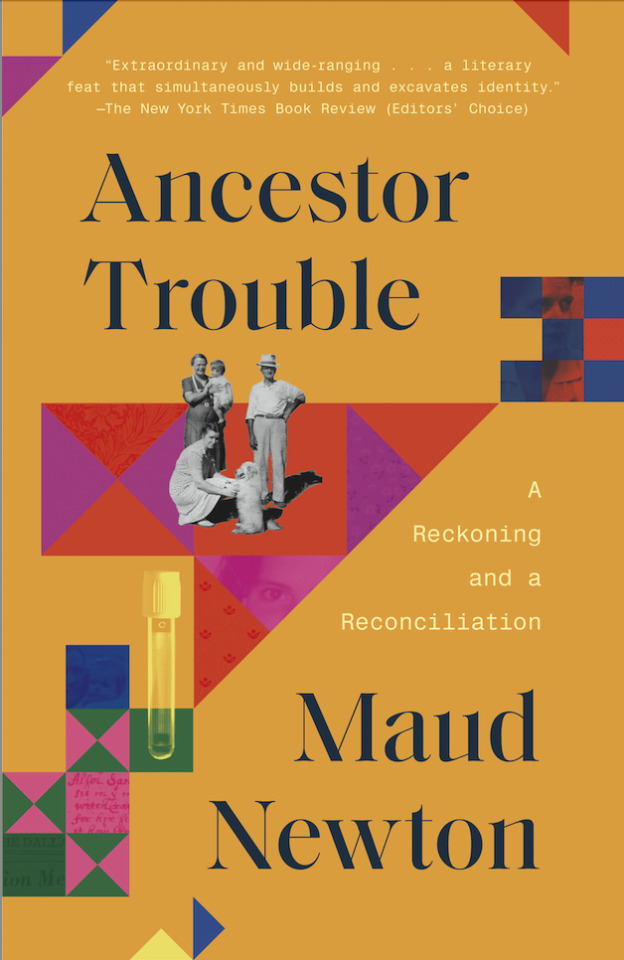
Friends, it's been a while. How've you been, apart from... everything? Catch me up if you'd like.
If you don't remember why you're following me: I'm a writer. You might like my book, Ancestor Trouble, if you're interested in family history, genealogy, mental health, generational trauma, systemic harms, and spiritual practices around ancestors and our alienation from those practices in Western modernity. I was finishing it up at the end of the first Trump administration, and to be perfectly honest I viewed it in part at that time it as a kind of stealth self-help book for people who might be groping toward the same kinds of questions in a period where the world seemed to be moving backward.
Ancestor Trouble was called a book of the year by the New Yorker, NPR, the Washington Post, Time, the Boston Globe, Esquire, Garden & Gun, and more. It was a pick for Roxane Gay's Audacious Book Club and a New York Times Editors' Choice selection, and a finalist for the National Book Critics Circle's John Leonard Prize for a first book in any genre.
In a sense it's a memoir, and it's also broader than a pure memoir. On Bluesky, the religion professor Seth Shafer recently described it as "the most unexpected textbook I use [in my Death and the Afterlife class] because it shows very personally how the dead always have a relationship with us whether we know it or not. It's also got the best treatment of ancestor religion I've ever read." A review in the latest National Genealogical Society Quarterly characterizes Ancestor Trouble as fascinating, fun, engaging, and relatably meandering.
Here are some excerpts and related essays:
My Ancestors Enslaved Black People; Acknowledging that Matters, for Guardian US
A Doorway, an Ancestor Trouble excerpt, at Medium
Learning About Ourselves From Genealogy, an Ancestor Trouble excerpt, at Wall Street Journal
On My Father, an Ancestor Trouble excerpt, at Esquire
On Uncovering Family Histories America Is Still Wresting With, an Ancestor Trouble excerpt, at Time
My Accused Witch Ancestor Was Also an Enslaver, at Medium
The seeds of the book were family history posts on my blog in the aughts, and a Harper's cover story, America's Ancestry Craze, in 2014.
#maud newton#genealogy#ancestors#ancestor trouble#family history#slavery#death and dying#death and the afterlife#ancestral healing
150 notes
·
View notes
Text
“Don’t let the structure of your novel be the reveal, the thing the novel works toward. The structure should be evident or felt as we proceed, as it allows room for something deeper and more interesting to emerge.“ "When you do this, you withhold not just the structure but really the novel.”
— Something I wrote to a student over a decade ago.
40 notes
·
View notes
Photo
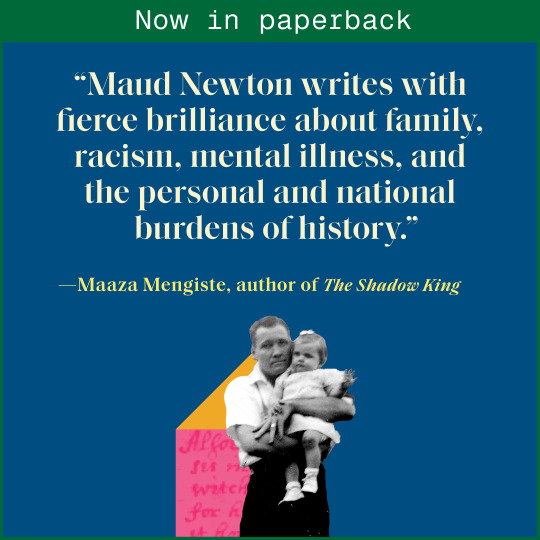
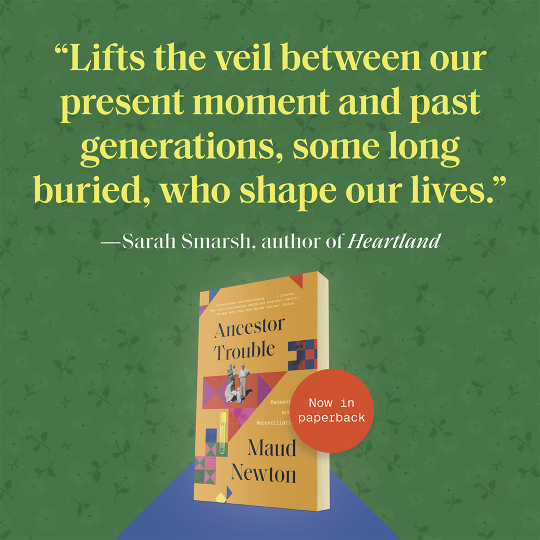
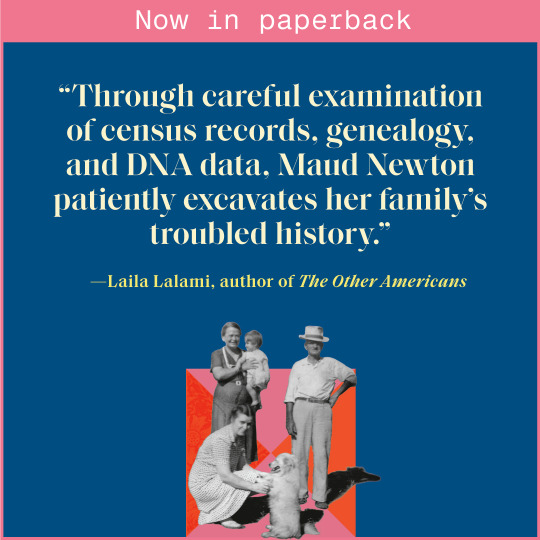
The publication of ANCESTOR TROUBLE in paperback is a good time to thank readers for all of your astonishing support and interest over the past year. I am immensely, intensely, continuously grateful.
4 notes
·
View notes
Photo

Hello! My book, Ancestor Trouble: A Reckoning and a Reconciliation, will be published by Random House in March 2022.
10 notes
·
View notes
Text
I, Rodent: Humanized Mice and Mousey Humans
I wrote about science and self and wanted and unwanted rodents: I, Rodent.
This is probably the strangest essay I've published to date. I like it a lot.
13 notes
·
View notes
Photo

I keep meaning to mention that The Best American Travel Writing 2015 is out with a short NYT Mag essay of mine in it. And I just learned from a friend today that my Harper’s ancestry essay was a notable mention in Best American Essays 2015. Thanks, Best American series!
It’s nice to know people are reading work so closely related to the book I’m writing.
19 notes
·
View notes
Text
A bedtime story

Once upon a time, many years ago, people used to vent on their blogs when things in their lives that wanted venting were happening. They vented not in a delicate or subtweeting way but in a full-on here's-what's-getting-to-me way, because no one in their non-bloggy lives knew what a blog was. Also, because anonymity. Yep, that surely was a very long time ago! The End.
100 notes
·
View notes
Photo




I’ve been reading letters my mom wrote when I was little, just after I turned two. It’s strange how much like myself I already was at that age.
Do you have letters like this from your childhood, or from your ancestors’ childhoods? Letters that seem like clues about your or their future selves?
24 notes
·
View notes
Photo

Although she’s an atheist, Herter is especially critical of the science-religion duality that’s emerged in Western culture. “That they are somehow two different magisterial domains that can’t cross each other is just so fundamentally untrue.” Many early scientific practices emerged from religion, and even now “many, many scientists also have deep-seated beliefs, right? Some things they are driven to look for and to contemplate and investigate come out of these kinds of questions, like ‘what does it mean to be you?” She understands the issues, “especially as somebody who is not religious, who is very much an atheist. At the end of the day I will put my faith in science more than I will put my faith in god, but I will also recognize that it doesn’t have all the answers.”
Religion has, as its critics say, wrought intolerance and violence, but “we are equally and often as oppressed and exploited and done violence to by science. We forget that anything that we give explicit and uncontrollable authority to has a power to be oppressive and violent and is often used for these purposes. Science is not neutral and we endow it with authority by calling something that is science neutral because then you give it a power to be whatever anybody wants it to be. You’ve invested it with its own supernatural status.”
I agreed. “The thing that fascinates me as a complete layperson about science,” I said, “is that the moment a scientific concept turns out to be untrue, it is no longer science. So science has a built-in way of sidestepping accountability for mistakes made in its name.”
She noted the tension between science as “a set of methodologies that we practice” and science as an epistemological framework...
One of my favorite parts of the conversation(s) I had with Cosima Herter, orphanblack’s super-smart science advisor.
507 notes
·
View notes
Photo

“My daughter doesn’t have a father, or, she has two fathers, since I don’t know which man her father is. One of her fathers says it’s like Schrödinger’s cat in there—right now, both men are fathers of hers at the same time. But when I’m cut open, or when I’m emptied, when she comes out of the box, only one man will be her father, and the other won’t be anything. The other father says, It’s like a Dutch auction. We’re crossing the highway by the river. It’s August now, I’m nine months pregnant, huge and round. When I walk on the sidewalk, my groins and my pubic bone hurt. I say, I don’t know what a Dutch auction is. I love both men painfully. Maybe if I’d been less sloppy, it would be less painful.” – Elizabeth Bachner’s wonderful “Gravity,” from the current issue of Hip Mama. (My goddaughter features in this essay, in utero and out!)
#elizabeth bachner#mothers#fathers#babies#reading to fetus#paul celan#poetry#hip mama#pregnancy#unknown paternity
25 notes
·
View notes
Text
Scene: Therapy Session, After My Second Cat Died Last Year
Me: I feel a little awkward going on about it. I mean, I always feel like therapists don’t have pets. They have clients.
Therapist: I had a dog!
Me: Oh! What happened to your dog?
Therapist: Well, I felt like I wasn’t home enough, so I had to find him a new home.
Me: ...
Therapist: ...
Therapist: So how are you feeling about Percy’s death?
23 notes
·
View notes
Text
Metafilter’s Orphan Black Profiles Wishlist
I’m enjoying these (inspired by “Science, Chance, and Emotion with Real Cosima,” my profile of the show’s science advisor, Cosima Herter):
"Boyfriends, Sestras, and Scorpions with Real Helena"
"Soap-making, Electioneering, and Body Disposal with Real Allison"
"Police Investigation, Train Schedules, and Impact Trauma with Real Beth"
"Kicking Ass, Negotiating with Crazies, and Wearing Black with Real Sarah"
7 notes
·
View notes
Photo

“BBC America’s Orphan Black seems so immediate, so plausible, so unfuturistic, that Cosima Herter, the show’s science consultant, is used to being asked whether human reproductive cloning could be happening in a lab somewhere right now. If so, we wouldn’t know, she says. It’s illegal in so many countries, no one would want to talk about it. But one thing is clear, she told me, when we met to talk about her work on the show: in our era of synthetic biology — of Craig Venter’s biological printer and George Church’s standardized biological parts, of three-parent babies and of treatment for cancer that involves reengineered viruses— genetics as we have conceived of it is already dead. We don’t have the language for what is emerging.”
I learned so many fascinating and scary things from Orphan Black’s Cosima Herter.
#cosima herter#real Cosima#genetics#synthetic biology#orphan black#cosima niehaus#the begats#maud newton
37 notes
·
View notes
Photo
I spoke with Orphan Black's brilliant science advisor, Cosima Herter -- "Real Cosima" -- about so many things, including feelings, philosophy, Darwin, "the yay, science bandwagon," cartoonish depictions of scientists, and how she came to be intimately involved in the science and politics of the show.
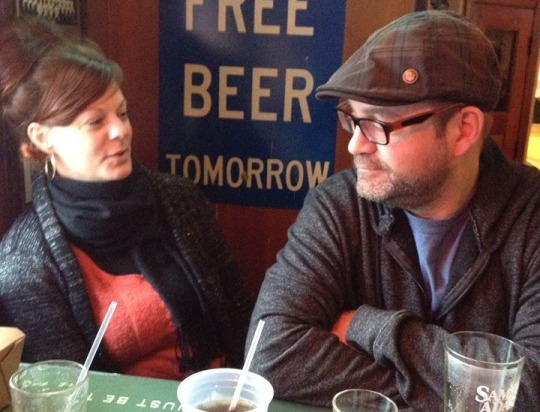
“Cosima Herter is so embedded in the fabric and ideas of the show that colleagues call her ‘Real Cosima,’ to distinguish her from Cosima Niehaus, the clone character she inspired. Like the show’s characters, like so many of us in this culture that seeks to decode our genes in an effort to predict and guide our futures, Herter is interested in the meeting of science, genetics, and chance.” Maud Newton, Science, Chance and Emotion with the Real Cosima
395 notes
·
View notes
Photo

On June 6, I’ll be speaking at the Global Family Reunion about my family, my interest in genealogy, ancestry, genetics, and the things we know and stories we tell ourselves about inheritance, and how my fascination with all of this became the book I’m writing. My talk will be at 3:30 p.m.
The reunion, brainchild of AJ Jacobs, also features Jacobs, Henry Louis Gates, CeCe Moore, George Church, Daniel Radcliffe, Lisa Loeb, and many others, and is a full day of events held on the old World’s Fair grounds in Queens.
Tickets are available at EventBrite. Proceeds benefit the Cure Alzheimer’s Fund. Free admission for kids.
13 notes
·
View notes
Photo

A couple days ago I learned that “A Doubter in the Holy Land,” my essay about visiting Jerusalem and wondering if I’d have a religious conversion like the one my mother once had, will be included in Best American Travel Writing 2015, which is very exciting.
The year’s guest editor is Andrew McCarthy, the actor, travel writer, and director. When I started searching around for his recent writing, I discovered that he’s also interested in family history!
A couple months ago National Geographic Traveler published “A Song for Ireland,” his essay about discovering that his McCarthys were from Kerry rather than (as he’d always thought) Cork.
“It was as if I awoke, after a lifetime of supporting the New York Yankees, to find that my people actually hailed from Boston, and I was meant to be a Red Sox fan,” he wrote.
The photo above is one Max took when we were in Jerusalem two years ago. “Maud casting a dubious eye on the allocation of space for men vs. women at the Wailing Wall” was his (accurate!) caption when he posted it on Facebook.
30 notes
·
View notes
Photo

In which Michael Chabon and Neil Gaiman discover (through autosomal DNA testing) that they are cousins.
#michael chabon#neil gaiman#genetic genealogy#dna#genealogy#ancestry#family tree#cousins#the begats#maud newton
1K notes
·
View notes